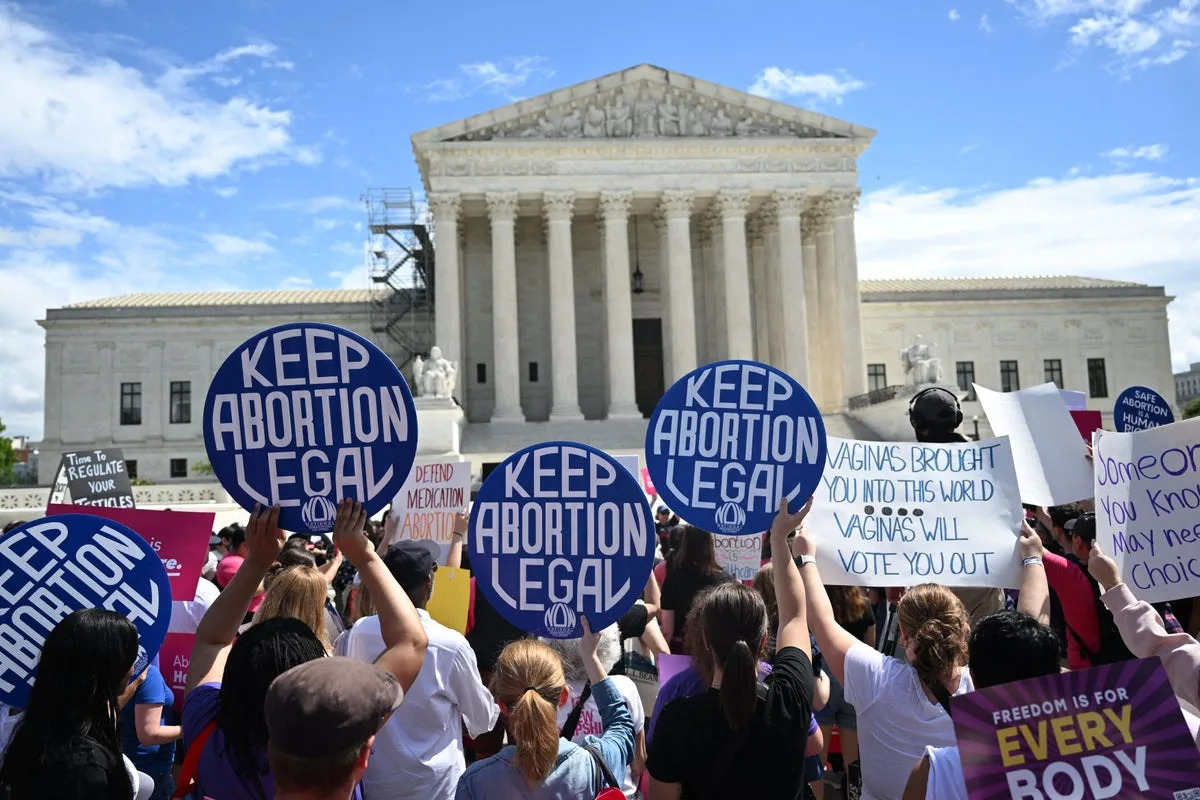A college student lost her pregnancy.
Then she was charged with homicide
Kelly Rissman
Wed 25 September 2024 at 1:46 pm GMT-6·5-min read

Demonstrators rally in support of abortion rights at the US Supreme Court (AFP via Getty Images)
A South Carolina State University junior suffered a pregnancy loss — then two months later, she was charged with homicide.
Amari Marsh, 23, is now speaking out about the harrowing ordeal, which her lawyers have argued was a devastating health emergency that had no business getting tied up in the court system. Her case serves as yet another example of how pregnancy is at risk of being criminalized in the wake of the Supreme Court’s reversal of Roe v. Wade — which protected the right to an abortion — in 2022.
“I couldn’t breathe,” Marsh told KFF Health News, recalling how in 2023, still in her second trimester, she suddenly gave birth in the middle of the night in her off-campus apartment. She said she screamed and cried as blood spilled across the bathroom floor, but she never could’ve imaged the loss would result in murder charges.
Just two months before the premature birth, Marsh had gone to Planned Parenthood in Columbia, South Carolina — where abortion has been banned after about 22 weeks — to “take the Plan-C pill which would possibly cause an abortion to occur,” according to an incident report obtained by the outlet. It doesn’t detail whether she actually took the pill. The report also notes that Marsh was advised to return to the clinic for a follow-up, which she never did.
But Marsh claimed to the outlet that she never went to Planned Parenthood and never took a pill to induce abortion.
“I’ve never been in trouble. I’ve never been pulled over. I’ve never been arrested,” she said. “I never even got written up in school.”
A month later, on February 28, the college junior went to the hospital after experiencing abdominal pains, and was informed she was pregnant and that a heartbeat had been detected. Marsh felt the “energy was off,” according to the report, and returned home. In the wee hours of the next morning, she gave birth in her toilet. “I screamed because I was scared, because I didn’t know what was going on,” she told the outlet.
Her then-boyfriend called 911, and the emergency dispatcher on the line “kept telling me to take the baby out” of the toilet, Marsh said. But she refused to do that: “I couldn’t because I couldn’t even keep myself together.”

Marsh’s ordeal is a “prime example of how pregnancy loss can become a criminal investigation very quickly,” said Dana Sussman, senior vice president of nonprofit Pregnancy Justice (Copyright 2024 The Associated Press. All rights reserved.)
As Marsh was transported to Regional Medical Center in Orangeburg, first responders retrieved the baby from the toilet and tried to perform life saving measures, which were ultimately unsuccessful.
While at the hospital, after Marsh was told that her baby hadn’t survived, a sheriff’s office deputy in her hospital room informed her that she was being investigated “due to the nature of the incident,” but that she was “currently not in any trouble,” the report states. Marsh insisted that she “did not feel as though she did anything wrong.”
Weeks later, in mid-May, an officer informed Marsh via text that he needed to meet with her in person “before I can close the case out. I am so sorry,” KFF Health News reported.
The meeting took place on May 2, 2023. It ended in her arrest, records show. She was charged with homicide by child abuse — which can result in a sentence of 20 years to life behind bars.
But a sentencing won’t happen. This August, more than a year after she was arrested, a grand jury declined to indict her.
The arrest warrant, obtained by KFF Health News, claims that refusing to move the baby from the toilet was “a proximate cause of her daughter’s death.”
Marsh’s attorneys believe her case belongs nowhere near the court system.
“This is not a criminal matter,” Zipporah Sumpter, one of Marsh’s lawyers, told the outlet. She accused authorities of treating the college student as a criminal rather than a grieving mother.
South Carolina Democratic state Rep Seth Rose, who is also one of Marsh’s attorneys, called it a “really tragic” case. He told the outlet: “It’s our position that she lost a child through natural causes.”
Marsh’s ordeal is a “prime example of how pregnancy loss can become a criminal investigation very quickly,” Dana Sussman, senior vice president of nonprofit Pregnancy Justice, told the outlet.
“The Dobbs decision unleashed and empowered prosecutors to look at pregnant people as a suspect class and at pregnancy loss as a suspicious event,” Sussman said.
In Ohio, Brittany Watts was criminally charged with abuse of a corpse after law enforcement found the remains of a fetus stuck in her toilet in September 2023; she had been repeatedly denied medical care to treat her miscarriage due to doctors’ uncertainty over whether she could legally abort the fetus. A grand jury ultimately declined to indict her.
Marsh told KFF Health News she is still processing the harrowing series of events, and keeps daughter’s ashes on a bookshelf in her bedroom. She’s taking classes at a local community college and hopes to soon re-enroll at South Carolina State University. She aspires to become a doctor.
“Through all of this, I found my strength. I found my voice. I want to help other young women that are in my position now and will be in the future,” Marsh told the outlet. “I always had faith that God was going to be on my side, but I didn’t know how it was going to go with the justice system we have today.
Kelly Rissman
Wed 25 September 2024 at 1:46 pm GMT-6·5-min read

Demonstrators rally in support of abortion rights at the US Supreme Court (AFP via Getty Images)
A South Carolina State University junior suffered a pregnancy loss — then two months later, she was charged with homicide.
Amari Marsh, 23, is now speaking out about the harrowing ordeal, which her lawyers have argued was a devastating health emergency that had no business getting tied up in the court system. Her case serves as yet another example of how pregnancy is at risk of being criminalized in the wake of the Supreme Court’s reversal of Roe v. Wade — which protected the right to an abortion — in 2022.
“I couldn’t breathe,” Marsh told KFF Health News, recalling how in 2023, still in her second trimester, she suddenly gave birth in the middle of the night in her off-campus apartment. She said she screamed and cried as blood spilled across the bathroom floor, but she never could’ve imaged the loss would result in murder charges.
Just two months before the premature birth, Marsh had gone to Planned Parenthood in Columbia, South Carolina — where abortion has been banned after about 22 weeks — to “take the Plan-C pill which would possibly cause an abortion to occur,” according to an incident report obtained by the outlet. It doesn’t detail whether she actually took the pill. The report also notes that Marsh was advised to return to the clinic for a follow-up, which she never did.
But Marsh claimed to the outlet that she never went to Planned Parenthood and never took a pill to induce abortion.
“I’ve never been in trouble. I’ve never been pulled over. I’ve never been arrested,” she said. “I never even got written up in school.”
A month later, on February 28, the college junior went to the hospital after experiencing abdominal pains, and was informed she was pregnant and that a heartbeat had been detected. Marsh felt the “energy was off,” according to the report, and returned home. In the wee hours of the next morning, she gave birth in her toilet. “I screamed because I was scared, because I didn’t know what was going on,” she told the outlet.
Her then-boyfriend called 911, and the emergency dispatcher on the line “kept telling me to take the baby out” of the toilet, Marsh said. But she refused to do that: “I couldn’t because I couldn’t even keep myself together.”

Marsh’s ordeal is a “prime example of how pregnancy loss can become a criminal investigation very quickly,” said Dana Sussman, senior vice president of nonprofit Pregnancy Justice (Copyright 2024 The Associated Press. All rights reserved.)
As Marsh was transported to Regional Medical Center in Orangeburg, first responders retrieved the baby from the toilet and tried to perform life saving measures, which were ultimately unsuccessful.
While at the hospital, after Marsh was told that her baby hadn’t survived, a sheriff’s office deputy in her hospital room informed her that she was being investigated “due to the nature of the incident,” but that she was “currently not in any trouble,” the report states. Marsh insisted that she “did not feel as though she did anything wrong.”
Weeks later, in mid-May, an officer informed Marsh via text that he needed to meet with her in person “before I can close the case out. I am so sorry,” KFF Health News reported.
The meeting took place on May 2, 2023. It ended in her arrest, records show. She was charged with homicide by child abuse — which can result in a sentence of 20 years to life behind bars.
But a sentencing won’t happen. This August, more than a year after she was arrested, a grand jury declined to indict her.
The arrest warrant, obtained by KFF Health News, claims that refusing to move the baby from the toilet was “a proximate cause of her daughter’s death.”
Marsh’s attorneys believe her case belongs nowhere near the court system.
“This is not a criminal matter,” Zipporah Sumpter, one of Marsh’s lawyers, told the outlet. She accused authorities of treating the college student as a criminal rather than a grieving mother.
South Carolina Democratic state Rep Seth Rose, who is also one of Marsh’s attorneys, called it a “really tragic” case. He told the outlet: “It’s our position that she lost a child through natural causes.”
Marsh’s ordeal is a “prime example of how pregnancy loss can become a criminal investigation very quickly,” Dana Sussman, senior vice president of nonprofit Pregnancy Justice, told the outlet.
“The Dobbs decision unleashed and empowered prosecutors to look at pregnant people as a suspect class and at pregnancy loss as a suspicious event,” Sussman said.
In Ohio, Brittany Watts was criminally charged with abuse of a corpse after law enforcement found the remains of a fetus stuck in her toilet in September 2023; she had been repeatedly denied medical care to treat her miscarriage due to doctors’ uncertainty over whether she could legally abort the fetus. A grand jury ultimately declined to indict her.
Marsh told KFF Health News she is still processing the harrowing series of events, and keeps daughter’s ashes on a bookshelf in her bedroom. She’s taking classes at a local community college and hopes to soon re-enroll at South Carolina State University. She aspires to become a doctor.
“Through all of this, I found my strength. I found my voice. I want to help other young women that are in my position now and will be in the future,” Marsh told the outlet. “I always had faith that God was going to be on my side, but I didn’t know how it was going to go with the justice system we have today.

No comments:
Post a Comment